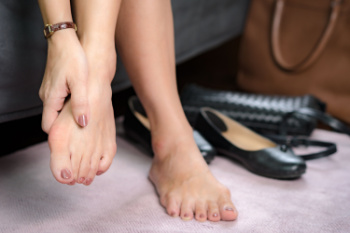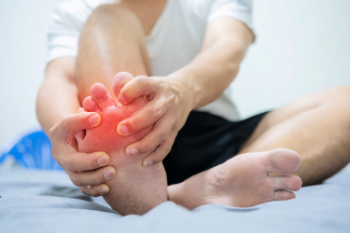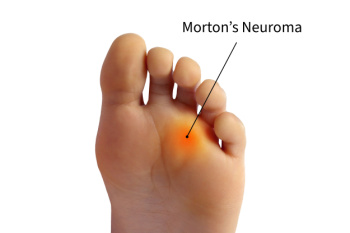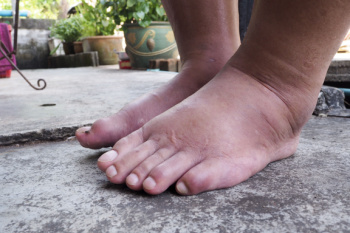Connect With Us
Blog
Items filtered by date: March 2025
The Connection Between High Heels and Bunions

A bunion is a bony bump that forms at the base of the big toe when the joint becomes misaligned. This condition develops gradually as the big toe shifts toward the smaller toes, causing inflammation, discomfort, and difficulty wearing certain shoes. High heels do not directly cause bunions, but they can contribute to their development by placing excessive pressure on the front of the foot. Shoes with a narrow toe box force the toes into an unnatural position, increasing strain on the joint. People with a genetic predisposition or preexisting foot conditions are more likely to develop bunions when wearing high heels frequently. If you have a bunion, it is suggested that you consult a podiatrist who can offer you appropriate treatment solutions, and guide you on what type of shoes to wear to prevent bunions.
If you are suffering from bunion pain, contact Cathy Coker, DPM of Arch Advantage Foot & Ankle Center. Our doctor can provide the care you need to keep you pain-free and on your feet.
What Is a Bunion?
Bunions are painful bony bumps that usually develop on the inside of the foot at the joint of the big toe. As the deformity increases over time, it may become painful to walk and wear shoes. Women are more likely to exacerbate existing bunions since they often wear tight, narrow shoes that shift their toes together. Bunion pain can be relieved by wearing wider shoes with enough room for the toes.
Causes
- Genetics – some people inherit feet that are more prone to bunion development
- Inflammatory Conditions - rheumatoid arthritis and polio may cause bunion development
Symptoms
- Redness and inflammation
- Pain and tenderness
- Callus or corns on the bump
- Restricted motion in the big toe
In order to diagnose your bunion, your podiatrist may ask about your medical history, symptoms, and general health. Your doctor might also order an x-ray to take a closer look at your feet. Nonsurgical treatment options include orthotics, padding, icing, changes in footwear, and medication. If nonsurgical treatments don’t alleviate your bunion pain, surgery may be necessary.
If you have any questions, please feel free to contact our office located in Indianapolis, IN . We offer the newest diagnostic and treatment technologies for all your foot care needs.
Ankle Fracture? Don’t Wait for Treatment
When Arthritis Targets Your Toes

Arthritis in the toes can feel like a deep, aching pain that worsens with movement. Stiffness, swelling, and tenderness are common, making it difficult to walk or wear certain shoes. Some people notice a grinding sensation as the cartilage wears down, while others experience redness and warmth surrounding the joints. Over time, deformities like bunions or clawed toes may develop. This condition happens when the protective cartilage in the toe joints deteriorates, leading to bone-on-bone friction. Osteoarthritis is the most common type, often linked to aging, past injuries, or genetics. Rheumatoid arthritis, an autoimmune disease, can also cause painful inflammation in the toes. Anyone can develop arthritis, but it is more common in older adults, athletes, and those with a family history. If toe pain is limiting your mobility, it is suggested that you see a podiatrist who can provide an accurate diagnosis and treatment.
Toe pain can disrupt your daily activities. If you have any concerns, contact Cathy Coker, DPM of Arch Advantage Foot & Ankle Center. Our doctor can provide the care you need to keep you pain-free and on your feet.
What Causes Toe Pain?
Most severe toe pain is caused due to a sports injury, trauma from dropping something heavy on the toe, or bumping into something rigid. Other problems can develop over time for various reasons.
Toe pain can be caused by one or more ailments. The most common include:
- Trauma
- Sports injury
- Wearing shoes that are too tight
- Arthritis
- Gout
- Corns and calluses
- Hammertoe
- Bunions
- Blisters
- Ingrown toenails
- Sprains
- Fractures (broken bones)
- Dislocations
When to See a Podiatrist
- Severe pain
- Persistent pain that lasts more than a week
- Signs of infection
- Continued swelling
- Pain that prevents walking
Diagnosis
In many cases the cause of toe pain is obvious, but in others, a podiatrist may want to use more advanced methods to determine the problem. These can range from simple visual inspections and sensation tests to X-rays and MRI scans. Prior medical history, family medical history, and any recent physical traumatic events will all be taken into consideration for a proper diagnosis.
Treatment
Treatments for toe pain and injuries vary and may include shoe inserts, padding, taping, medicines, injections, and in some cases, surgery. If you believe that you have broken a toe, please see a podiatrist as soon as possible.
If you have any questions please feel free to contact our office located in Indianapolis, IN . We offer the newest diagnostic tools and technology to treat your foot and ankle needs.
What Is Morton’s Neuroma?

Morton’s neuroma is a painful condition that affects the ball of the foot, typically between the third and fourth toes. It occurs when the tissue surrounding the nerve becomes thickened, often due to irritation or pressure. The symptoms include a sharp, burning pain, a sensation of something being stuck in your shoe, or numbness in the toes. The pain usually worsens with activity or wearing tight shoes, particularly high heels. The primary causes of Morton’s neuroma are repetitive pressure on the feet, such as from tight shoes or high heels, flat feet, or abnormal foot mechanics. A podiatrist can help diagnose Morton’s neuroma through a physical examination and imaging tests. Treatment options include footwear changes, padding, custom orthotics to reduce pressure, and anti-inflammatory medication. In some cases, injections or surgical removal of the affected tissue may be necessary. If you have any of the above symptoms, it is suggested that you schedule an appointment with a podiatrist for proper diagnosis and appropriate care.
Morton’s neuroma is a very uncomfortable condition to live with. If you think you have Morton’s neuroma, contact Cathy Coker, DPM of Arch Advantage Foot & Ankle Center. Our doctor will attend to all of your foot care needs and answer any of your related questions.
Morton’s Neuroma
Morton's neuroma is a painful foot condition that commonly affects the areas between the second and third or third and fourth toe, although other areas of the foot are also susceptible. Morton’s neuroma is caused by an inflamed nerve in the foot that is being squeezed and aggravated by surrounding bones.
What Increases the Chances of Having Morton’s Neuroma?
- Ill-fitting high heels or shoes that add pressure to the toe or foot
- Jogging, running or any sport that involves constant impact to the foot
- Flat feet, bunions, and any other foot deformities
Morton’s neuroma is a very treatable condition. Orthotics and shoe inserts can often be used to alleviate the pain on the forefront of the feet. In more severe cases, corticosteroids can also be prescribed. In order to figure out the best treatment for your neuroma, it’s recommended to seek the care of a podiatrist who can diagnose your condition and provide different treatment options.
If you have any questions, please feel free to contact our office located in Indianapolis, IN . We offer the newest diagnostic and treatment technologies for all your foot care needs.
Causes of Swollen Feet and Ankles

Swollen feet and ankles can result from various conditions, including circulatory problems, kidney disease, or injury. Fluid retention, or edema, often occurs when the body struggles to regulate fluid movement due to issues such as heart or liver disease. Venous insufficiency, a condition in which vein valves do not function properly, can cause blood to pool in the lower legs, leading to persistent foot and ankle swelling. Ankle sprains and other foot injuries frequently cause localized swelling due to soft tissue damage. Infections, including cellulitis, can also lead to swelling, particularly in people with diabetes who may have a higher risk of foot complications. A blood clot in a leg vein, also termed deep vein thrombosis, can result in swelling and requires immediate attention. A podiatrist can evaluate the cause of swelling, recommend appropriate treatment, and help manage symptoms to prevent complications. If you have unusual or painful swollen feet or ankles, it is suggested that you schedule an appointment with a podiatrist for an exam, diagnosis, and treatment options.
Swollen feet can be a sign of an underlying condition. If you have any concerns, contact Cathy Coker, DPM of Arch Advantage Foot & Ankle Center. Our doctor can provide the care you need to keep you pain-free and on your feet.
Swollen feet are a common ailment among pregnant women and people who stand or sit for extended periods. Aging may increase the possibility of swollen feet and patients who are obese often notice when their feet are swelling too. There may be medical reasons why swollen feet occur:
- Phlebitis - A condition that causes the veins to become inflamed and can also cause leg pain.
- Liver disease - This may lead to low blood levels of albumin which is a protein. This can cause fluid in the blood to pass into the tissues and several areas of the body can become swollen.
- Heart failure - When the heart doesn’t pump properly the blood that is normally pumped back to the heart can pool in the veins of the legs causing swollen feet.
- Kidney disease - One of the main functions of the kidneys is releasing excess fluid in the body. This type of condition can make it difficult for the kidneys to function properly, and as a result the feet may become swollen.
- Deep-vein thrombosis (DVT)- This is a serious condition where blood clots form in the veins of the legs. They can block the return of blood from the legs to the heart which may cause the feet to swell. It is important to be treated by a podiatrist if this condition is present.
Swollen feet can also be caused by bone and tendon conditions, including fractures, arthritis, and tendinitis. Additionally, there may be skin and toenail conditions and an infection may cause the feet to swell. Patients who take medicine to treat high blood pressure may be prone to getting swollen feet.
Many patients elevate their feet to help relieve the swelling and this is generally a temporary remedy. When a podiatrist is consulted the reason behind the swelling can be uncovered and subsequently treated.
If you have any questions please feel free to contact our office located in Indianapolis, IN . We offer the newest diagnostic tools and technology to treat your foot and ankle needs.

